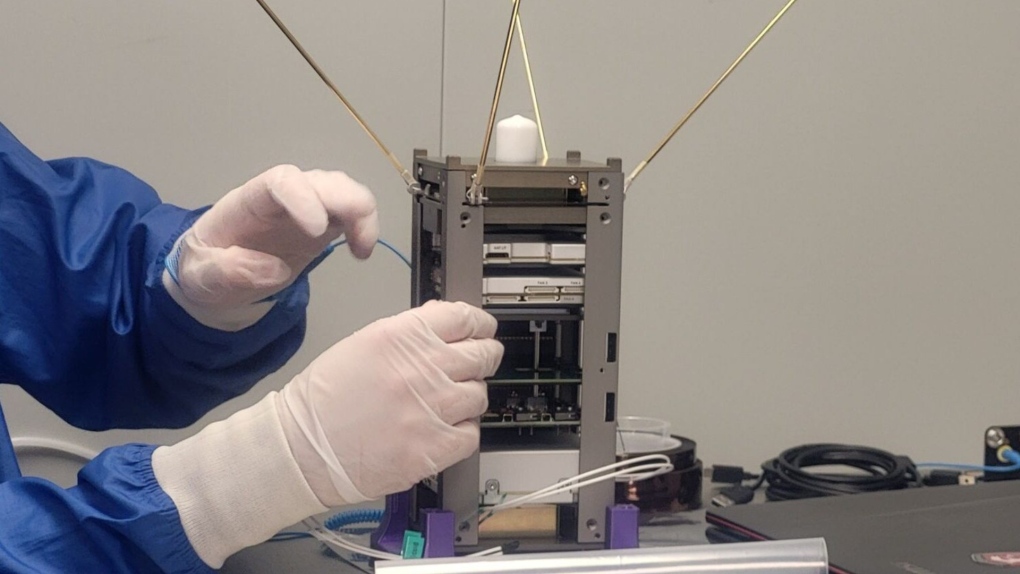An out of this world opportunity: Western students to launch mini satellite aboard SpaceX mission
Constructed by a team at London, Ont.’s Western University, a tiny satellite — roughly the size of a Rubik’s cube — will ride aboard a SpaceX mission bound for the International Space Station.
According to Western University, the first ever miniature satellite built by a team at Western, also known as CubeSat, is set for liftoff from Complex 39A at the Kennedy Space Center in Florida. The launch will provide students the opportunity to learn first-hand about space mission development.
The launch was initially slated for June 3 at 12:34 p.m. but was scrubbed, and is now rescheduled for June 5 at 11:47 a.m.
A ‘CubeSat’ is a cubical mini satellite measuring 10 cm X 10 cm X 10 cm and weighing 1 kg. It can be used alone or in groups, for a maximum of 24 units.
Referred to as “great equalizers” in terms of space exploration and Earth observation, CubeSats are small, modular and relatively inexpensive and easy to launch, according to Western.
Focusing on “delivering equitable opportunities to post-secondary students across the country,” the Canadian CubeSat Project (CCP) was launched by the Canadian Space Agency in 2017.
 Ukpik-1, built by a team at London, Ont.'s Western University, being prepared for launch ahead of its June 2023 launch to the International Space Station. (Source: Western University)
Ukpik-1, built by a team at London, Ont.'s Western University, being prepared for launch ahead of its June 2023 launch to the International Space Station. (Source: Western University)
Led by engineering professor Jayshri Sabarinathan, a team at Western has worked with the Nunavut Arctic College (NAC) since 2018 to develop a CubSat called Ukpik-1 — and it’s this mini satellite that has a one-way ticket to the International Space Station (ISS).
With Monday’s tentative launch date, Ukpik-1 will hitch a ride aboard SpaceX’s Dragon cargo ship CRS-28. Upon arrival at the ISS, the mini satellite will be ejected through an airlock to begin its mission.
“Ukpik-1’s primary goal, which echoes the promise of CCP, is giving students at Western and NAC an out-of-this-world educational opportunity to learn about a space mission development from end to end (conception to operations) while working closely with academic, government and industry partners,” according to Western.
The secondary goal of the mission is to allow students at Western and NAC and faculty the chance to operate an immersive virtual reality camera while in orbit in order to collect various images and data.
CTVNews.ca Top Stories

opinion Tom Mulcair: Prime Minister Justin Trudeau's train wreck of a final act
In his latest column for CTVNews.ca, former NDP leader and political analyst Tom Mulcair puts a spotlight on the 'spectacular failure' of Prime Minister Justin Trudeau's final act on the political stage.
B.C. mayor gets calls from across Canada about 'crazy' plan to recruit doctors
A British Columbia community's "out-of-the-box" plan to ease its family doctor shortage by hiring physicians as city employees is sparking interest from across Canada, says Colwood Mayor Doug Kobayashi.
'There’s no support': Domestic abuse survivor shares difficulties leaving her relationship
An Edmonton woman who tried to flee an abusive relationship ended up back where she started in part due to a lack of shelter space.
opinion King Charles' Christmas: Who's in and who's out this year?
Christmas 2024 is set to be a Christmas like no other for the Royal Family, says royal commentator Afua Hagan. King Charles III has initiated the most important and significant transformation of royal Christmas celebrations in decades.
Baseball Hall of Famer Rickey Henderson dead at 65, reports say
Rickey Henderson, a Baseball Hall of Famer and Major League Baseball’s all-time stolen bases leader, is dead at 65, according to multiple reports.
Arizona third-grader saves choking friend
An Arizona third-grader is being recognized by his local fire department after saving a friend from choking.
Germans mourn the 5 killed and 200 injured in the apparent attack on a Christmas market
Germans on Saturday mourned the victims of an apparent attack in which authorities say a doctor drove into a busy outdoor Christmas market, killing five people, injuring 200 others and shaking the public’s sense of security at what would otherwise be a time of joy.
Blake Lively accuses 'It Ends With Us' director Justin Baldoni of harassment and smear campaign
Blake Lively has accused her 'It Ends With Us' director and co-star Justin Baldoni of sexual harassment on the set of the movie and a subsequent effort to “destroy' her reputation in a legal complaint.
Oysters distributed in B.C., Alberta, Ontario recalled for norovirus contamination
The Canadian Food Inspection Agency has issued a recall due to possible norovirus contamination of certain oysters distributed in British Columbia, Alberta and Ontario.


































